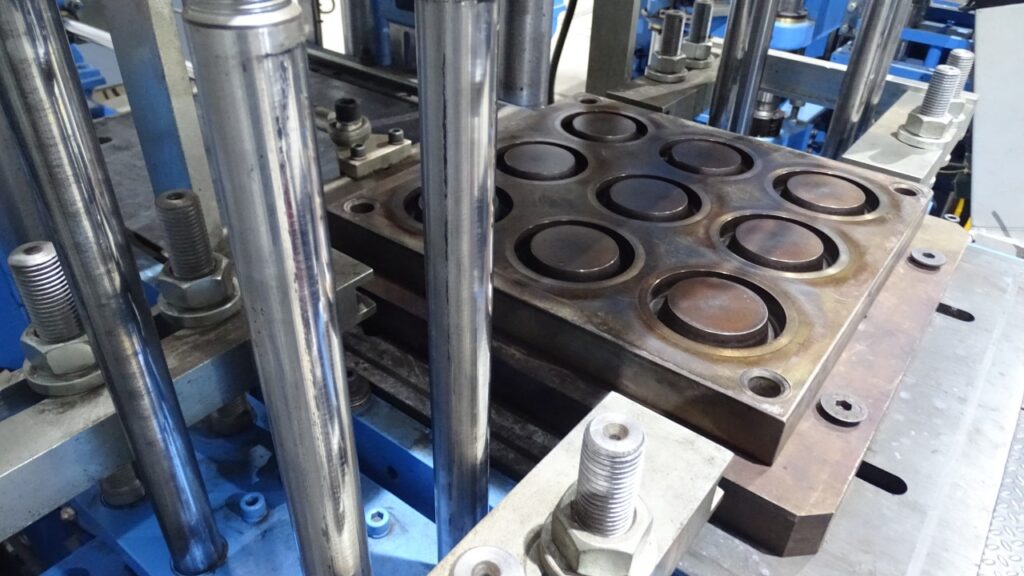Rubber mould manufacturing is a tailor-made process because of which manufacture of a vast array of rubber parts is feasible in the automotive, aerospace, medical, electronics, and consumer industries. At My Design Minds, we specialize in custom rubber mould manufacturing in India, offering solutions for everything from rubber gaskets and seals to injection-moulded automotive components. Rubber mould manufacturing is critical in industrial rubber components manufacturing, enabling mass production of durable, high-performance rubber parts.
At My Design Minds, we specialize in custom rubber mould manufacturing in India, catering to diverse industries with high-precision, cost-effective rubber moulding services. Our expertise includes rubber injection moulding services in India and tailored solutions for automotive, electronics, and medical sectors.

Rubber Moulding Process
1. Compression Moulding
- Process: An established quantity of uncured rubber (charge) is introduced into an open, hot mould cavity. Pressure is applied and mould closed, pushing the rubber into the mould cavity. The rubber is heated and under pressure until cured.
- Applications: Heavy, uncomplicated articles such as gaskets, seals, and mats.
2. Transfer Moulding
- Use: Rubber charge is charged in a pot and plunged down into a sprue- and runner-closed mould cavity. More complicated shapes, and objects embedded, can be used with it.
- Use: Complicated seals, electrical insulation, and metal insert components.
3. Injection Moulding
- Use: Unvulcanised rubber is pressure-pressed and heat-finished into a close mould. Highly automated and ideal for small complicated parts in large quantity.
- Applications: O-rings, grommets, medical devices, and precision motor vehicle components.
Rubber Mould Materials

- Tool Steels (P20, H13, S7): Widely used owing to high hardness, strength, and resistance to heat and wear.
- Aluminium: Employed in prototype or small-scale production moulds owing to ease of machinability and economy.
- Beryllium-Copper Alloys: Comparatively rare usage for inserts or moulds where there is a requirement for high thermal conductance.
- Rubber Compounds
- Natural Rubber: Enhanced resilience and elasticity.
- Man-made Rubber (EPDM, NBR, SBR, Silicone, Viton): Selected for particular characteristics such as chemical, heat, and toughness.
Rubber Mould Design Considerations
- Geometry of part: The part complexity will determine the moulding process and mould design selection.
- Shrinkage: The rubber shrinks during curing; moulds must accommodate this.
- Venting: Venting avoids air entrapment and allows for mould filling and curing through.
- Injection: Injection systems need to be incorporated to eject the finished part in a secure way.
- Surface Finish: Mould surface finish determines the functionality and appearance of the rubber product.
Rubber Mould Manufacturing – 6 essential steps to complete Manufacturing Process
Rubber mould manufacturing is a critical process used in producing custom rubber components for various industrial applications. By following a precise series of steps, manufacturers ensure accuracy, durability, and repeatability in every part produced.
1. Designing and Engineering :
Our rubber mould design and fabrication process begins with CAD modelling, followed by precision machining using CNC and EDM techniques.
- Product Analysis: Engineers review the part’s geometry, material, and performance specifications.
- Mould Design: Mould is created on CAD software, i.e., cavities, runners, vents, and ejection systems.
- Simulation: Simulation of rubber cure and flow using new software to forecast probable defects.
2. Material Preparation
- Selection: Mould material is selected based on product quantity, product complexity, and type of rubber.
- Cutting: Raw material cutting to size for mould inserts and base.
3. Machining and Fabrication
- CNC Machining: To fabricate accurate mould cavities and mould details.
- EDM (Electrical Discharge Machining): Employed to fabricate fine details and sharp edges.
- Polishing: Impacts the surface finish of the mould target cavity.
4. Heat Treatment
- Hardening and Tempering: Heat-treats tool steel moulds to achieve wear resistance and toughness.
5. Assembly and Testing
- Assembly: Assembles all the mould parts, including ejector systems and inserts.
- Trial Runs: Tests the mould on a press using the given rubber compound. In case of filling, curing, or ejection issues, adjustments are made.
6. Finishing and Maintenance
- Surface Coating: Occasionally applied to enhance release and cut wear.
- Routine Maintenance: Optimum life and repeatable component quality.
Our Rubber Moulding Services in Delhi NCR
Based in India, we proudly serve both local and international markets. From custom rubber mould manufacturing in Delhi NCR to high-volume rubber injection moulding services across India, we ensure premium quality, fast delivery, and engineering excellence. Our team supports multiple sectors including automotive, healthcare, consumer electronics, and industrial manufacturing.
Why Choose Our Custom Rubber Mould Manufacturing in India?
My Design Minds, has year’s of experience in Rubber Mould Manufacturing. We have team of professional`s with a deep understanding of materials, machining techniques, and industry-specific requirements.
Fine Quality
Our work is a testament to accuracy, innovation, and durability. Every mould we create is subjected to accurate quality control measures to ensure defect-free production. We don’t just manufacture moulds; we craft solutions that redefine precision.
Credibility and Reliability
Our portfolio of successful projects, partnerships with top-tier industries, and long-standing relationships with clients prove our credibility. When you work with My Design Minds, you’re collaborating with a team that values transparency and excellence.
Advanced Technology
We leverage the latest advancements in CNC machining, automation, and material science to deliver high-performance moulds that meet the highest industry standards.
Time Efficiency
Time efficiency is a core value at My Design Minds. We understand the importance of deadlines, ensuring a quick turnaround time without compromising quality.
New Breakthroughs
Latest Innovations in Rubber Mould Manufacturing
Simulation Software: High-temperature, high-pressure simulation of cure eliminates trial-and-error and accelerates development.
High-Precision Machining: Enhances accuracy and trims lead times.
Additive Manufacturing: Employed for rapid prototypes of mould parts.
Advanced Coatings: Enhance mould life and ease part release.
Conclusion
As one of the leading rubber mould manufacturers in India, My Design Minds delivers reliable solutions to global and domestic industries. Rubber mould Manufacturing is a highly technically sophisticated process with engineering, tool precision, and materials science. Using the cutting-edge design, machining, and simulation capacity, moulds are created by firms that enable efficient, reproducible, and quality production of rubber components. As more complex and reliable rubber components are demanded by firms in recent years, the field of rubber mould making keeps evolving and growing, serving its very essential role in contemporary production.
Whether you’re looking for rubber moulding services in Delhi NCR or want to outsource rubber injection moulding services in India, My Design Minds is your trusted partner. As automotive rubber mould manufacturers in India, we offer innovative, end-to-end moulding solutions at competitive pricing.
